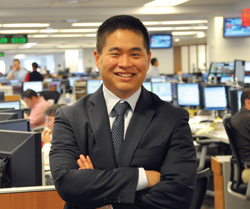(Bloomberg) — IEX Group Inc., already the subject of a best-selling book, has more to say about how its stock market can protect investors from high-frequency traders.
The firm is starting a public effort to explain exactly how its venue works and detail how it protects customers. IEX Chief Executive Officer Brad Katsuyama said in an interview with Bloomberg News that brokers need to allay concerns about the opacity of dark pools by making similar disclosures.

The only way to productively move this discussion forward is to get transparent about details and specifics, Katsuyama said in an e-mail on April 28. The industry continues to throw dust in the air every time this discussion comes up.
See Also:IEX Gains Momentum as Upstart Stock Market Tops Some Incumbents
Its not the first time that IEX has challenged its peers. At its start in October, the dark pool released the normally private regulatory filing that explains how it operates. Volume has steadily grown, with an average of 28.7 million shares changing hands on the platform each day this month, compared with 18.9 million in March. Total daily volume on all U.S. venues in April averaged 6.6 billion through yesterdays close, according to data compiled by Bloomberg.
Concerns about dark pools were amplified after the publication of Michael Lewiss Flash Boys, which portrayed an equities market where exchanges, broker-dealers and high- frequency traders are conspiring to cheat investors. The latest IEX push follows news that Fidelity Investments is talking to other investors about starting a trading venue, also with the aim of giving customers more information on how orders are handled. A forthcoming report by Tabb Group LLC also calls for improved transparency on off-exchange trading venues.
350 Microseconds
In a new section on its website, IEX explains what it calls its True Price feature, an illustration how a 350 microsecond delay slows down all its participants and how the measure works in practice. In one example, it shows that if a stocks price moves by 5 cents, the venue will not allow any trades to happen beyond the new price, in contrast to platforms which may not update quotes as quickly as the fastest traders.
One of the criticisms in Lewiss book is that some platforms process their data more slowly than their customers, which grants fast traders a peek into where a stocks price has moved fractions of a second before the information is disseminated by the venue.
Line Up
We decided to line up all the things involved in calculating a fair price to show everyone how it works, Katsuyama said. Hopefully other trading venues follow our lead.
In the latest effort, IEX says using the fastest data feeds from stock exchanges is no guarantee that a trading platform is safe from the speediest traders.
Even a venue that takes direct feeds may be slower than its participants that are using hardware assisted feed handlers, algorithms and other technologies tuned for the absolute minimal latency, it states.
Fidelity said on April 10 that it is exploring the creation of a trading venue along with other investors.
The venture under consideration would aim to address todays market structure, and provide higher levels of transparency, liquidity and control for the benefit of all fund shareholders, Vincent G. Loporchio, a senior vice president at Fidelity, wrote in an e-mail earlier this month.
Broader View
Fidelity would join a crowded field of more than 50 stock exchanges and alternative venues competing for trades. Tabb analyst Sayena Mostowfi, in a soon-to-be published report, says many factors need to be considered when choosing what platform to use.
TABB strongly recommends exercising caution in judging the value or quality of a venue by their volume, matching logic or speed, Mostowfi wrote. Execution quality analysis would be best derived in the context of each individual trading strategy first and then the venues/mechanism utilized to execute each order.
Mostowfi calls for improved transparency at private venues, noting that pending rules from the Financial Industry Regulatory Authority that reveal some details about off-exchange trading activity dont apply to retail wholesalers, which she estimates make up 19 percent of total U.S. trading volume. Wholesalers are market makers who pay for orders from retail brokerages and mostly fill the orders internally.
Mostowfi also suggests requiring better disclosure about how alternative trading systems such as dark pools operate.
Tabb Group is not advocating that ATSs be subject to the same approval process as an exchange, she wrote. We are advocating that the information be made public (as some venues have done) in a consistent and consolidated manner.



